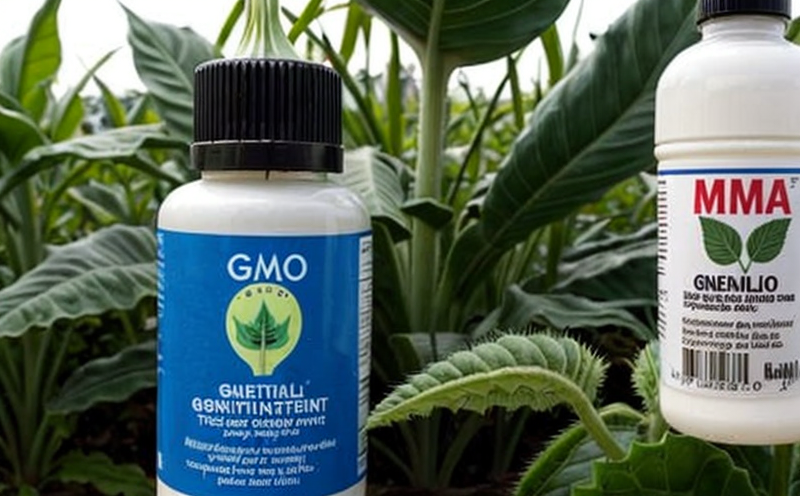ISO 59068 GMO Quantification in Processed Foods
The ISO 59068 standard provides a method for quantifying genetically modified organisms (GMOs) in processed foods. This service ensures that food products comply with international regulations regarding the presence of GMO ingredients, which is crucial for maintaining consumer trust and meeting legal requirements.
Compliance with this standard helps companies avoid potential legal issues related to mislabeling or non-compliance with country-specific regulations on GMO content. Laboratories adhering to ISO 59068 use advanced analytical techniques such as polymerase chain reaction (PCR) and quantitative real-time PCR (qPCR) for accurate quantification of target sequences specific to known GMOs.
The testing process involves several critical steps: sample preparation, DNA extraction, amplification using primers targeting unique regions within the inserted genetic material of the desired GMOs, followed by quantification through fluorescence detection. This ensures reliable and reproducible results that are essential for regulatory compliance.
Understanding the specific requirements underpinning this standard is key to successful implementation in food manufacturing processes. For instance, certain countries mandate strict labeling laws for products containing more than a predefined threshold of GMO content (typically 0.9% or less). Failure to meet these thresholds can lead to product recalls and damage to brand reputation.
Our laboratory utilizes state-of-the-art equipment including real-time PCR machines from leading manufacturers like ABI and Bio-Rad, ensuring precision and accuracy in every test conducted according to ISO 59068 guidelines. By leveraging this technology, we provide accurate quantification of GMO content down to sub-percentage levels, thus supporting robust compliance efforts.
When choosing a laboratory for GMO testing services, several factors come into play. Firstly, the laboratory must possess expertise in genetic analysis and experience with ISO 59068 methods. Secondly, it should have access to up-to-date technologies such as real-time PCR systems capable of detecting even minute quantities of GMOs.
Moreover, compliance with international standards adds credibility to test results, making them acceptable across various jurisdictions worldwide. Our commitment to excellence in every aspect of our operations guarantees reliable outcomes that meet stringent regulatory expectations.
Why It Matters
Compliance with ISO 59068 is vital for maintaining consumer trust and ensuring adherence to international regulations concerning genetically modified organisms (GMOs) in processed foods. This standard plays a pivotal role in safeguarding the integrity of food products by providing accurate quantification of GMO content.
- Consumer Trust: Ensures that consumers are informed about the presence or absence of GMO ingredients in their purchased goods, fostering trust and confidence in the brand.
- Legal Compliance: Helps companies avoid potential legal issues related to mislabeling or non-compliance with country-specific regulations on GMO content.
- Risk Management: Facilitates early detection of any discrepancies between expected and actual GMO levels, enabling proactive management strategies.
Failure to comply with these standards could result in severe consequences including product recalls, fines, and reputational damage. By adhering to ISO 59068 guidelines, businesses can ensure their products meet the highest quality standards while also contributing positively towards sustainable agricultural practices.
Why Choose This Test
- Accurate Quantification: Our laboratory uses advanced PCR and qPCR techniques to provide precise quantification of GMO content down to sub-percentage levels.
- International Standards Compliance: Adherence to ISO 59068 ensures that our results are recognized globally, enhancing credibility and acceptance across different jurisdictions.
- State-of-the-Art Equipment: Leveraging real-time PCR systems from top manufacturers like ABI and Bio-Rad guarantees accurate and reliable test outcomes.
- Expertise in Genetic Analysis: Our team of highly skilled professionals has extensive experience with ISO 59068 methods, ensuring consistent accuracy and precision.
By selecting our GMO quantification service, you gain access to a comprehensive suite of tools and expertise designed specifically for meeting the stringent requirements set forth by international standards. This not only supports your compliance efforts but also enhances your product's reputation in the market.
Use Cases and Application Examples
| Use Case | Description |
|---|---|
| Regulatory Compliance: | Ensuring that processed food products meet the required threshold for GMO content as mandated by various countries. |
| Product Labeling: | Accurate quantification of GMOs allows companies to label their products appropriately, maintaining transparency with consumers. |
| Risk Management: | Early detection of discrepancies between expected and actual GMO levels enables timely corrective actions. |
| Application Example | Description |
|---|---|
| Food Manufacturer: | A large-scale food manufacturer requires regular GMO quantification to ensure compliance with European Union directives on labeling. |
| Retailer: | A retail chain conducts periodic tests on its suppliers' products to verify that they adhere to strict GMO-free policies. |
| Research Institution: | An academic research institute focuses on developing new methods for detecting and quantifying specific types of GMOs in complex matrices like processed foods. |





